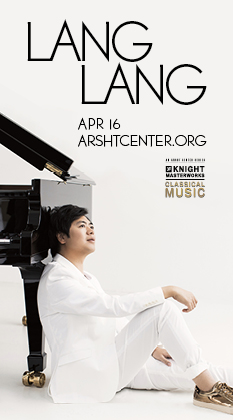Plain Dealer music critic sues, wants his paper and Cleveland Orchestra to face the music
 Donald Rosenberg, former classical music critic of The Plain Dealer, is suing his paper and the parent company of the Cleveland Orchestra following his reassignment after protests about overly negative reviews from orchestra officials.
Donald Rosenberg, former classical music critic of The Plain Dealer, is suing his paper and the parent company of the Cleveland Orchestra following his reassignment after protests about overly negative reviews from orchestra officials.
The lawsuit, outlined in today’s New York Times story by Daniel J. Wakin, seeks compensatory and punitive damages “well in excess of $50,000” for a “campaign of vilification” against Rosenberg from orchestra board members and officials and the Plain Dealer for reassigning him in response to the outside pressure.
Rosenberg is still employed at the Ohio paper as a music reporter and dance critic but is not allowed to review any concerts by the Cleveland Orchestra.
Reached in the Plain Dealer newsroom Friday afternoon, Rosenberg said he is seeking “a settlement that will compensate for the unsupported actions of the defendants.”
He stressed that he is “absolutely not” seeking to be reinstated to his former position and that he wholly supported Zachary Lewis, the former intern who is now reviewing Cleveland Orchestra concerts for The Plain Dealer. “This is a multilayered case that goes way beyond my reassignment,” Rosenberg said. “It’s about journalistic ethics, freedom of the press, defamation and many other things.”
Rosenberg’s lawsuit names several defendants, including The Plain Dealer and the newspaper’s editor, Susan Goldberg; the Cleveland Orchestra’s parent organization, the Musical Arts Association; Gary Hanson, the orchestra’s executive director; Richard Bogomolny, chairman and president; and James Ireland III, board member and former president.
In September Rosenberg who has been in his post at the Ohio paper for 16 years, was reassigned by Plain Dealer editor Susan Goldberg in response to intense and prolonged pressure by Cleveland Orchestra officials over what they perceived as excessively negative reviews of Franz Welser-Most, the orchestra’s music director.

In reviews and columns, Rosenberg has been critical and often scathing about what he viewed as the Austrian conductor’s limitations, though, on occasion, he has praised Welser-Most’s performances as well. Still, Welser-Most remains a controversial figure who attracts similar mixed-to negative notices from many American critics, including myself, The New York Times’ Anthony Tommasini and others. He also tends to sharply divide opinion among orchestra musicians. During an acrimonious tenure with the London Philharmonic Orchestra in the 1990s, he was infamously nicknamed “Frankly Worse than Most,” by a dubious orchestra member.
The Cleveland Orchestra, which opens its annual Miami residency January 30 at the Adrienne Arsht Center with Welser-Most on the podium, had no comment on the lawsuit and referred questions to its legal counsel, Robert Duvin.
“Our position is that [Rosenberg] has his opinion and we have ours,” said Duvin Friday afternoon. “Our position is that the Cleveland Orchestra and Franz are one of the greatest if not the greatest orchestra in the world, and have been acclaimed as such by every music critic in the world. Except for Don Rosenberg.”
I pointed out that while the Cleveland Orchestra usually receives stellar reviews, notices on Welser-Most tend to be mixed from many music journalists outside Cleveland. “You can’t show me any other critic who has been so relentlessly negative and critical” about Welser-Most, replied Duvin.
“This is about the music,” he added. “This is about the reputation of the Cleveland Orchestra.”
For his part, Rosenberg said he is not worried about any fallout from his action, including the possibility of The Plain Dealer firing him in retaliation for the lawsuit. “I’m not concerned what the consequences will be,” he said Friday. “I wouldn’t have filed this suit if I was afraid of anything.”
Posted in Uncategorized
One Response to “Plain Dealer music critic sues, wants his paper and Cleveland Orchestra to face the music”
Leave a Comment
Fri Dec 12, 2008
at 4:00 pm
1 Comment






Posted Dec 14, 2008 at 1:31 pm by Sean
I say this knowing boo about the law, but the Cleveland Orchestra lawyer quoted in the Times makes an interesting argument – that the Plain Dealer’s critic was in effect calling for the firing of the conductor by consistently panning his work. That’s a clever, roundabout way of saying nobody cut off the critic’s “speech” by agitating to get him off the beat, any more than the critic silenced the orchestra.
Yes, there are meaningful distinctions between “that’s one lousy conductor” and “get us a new reviewer, or else.” But those differences may not matter because this is not in my opinion a First Amendment case. It looks more like an employment discrimination case, if it has any basis in law at all. (And again my training amounts to Law & Order and Court TV.)
That’s why part of me feels like Donald Rosenberg’s target – if he feels he must sue – ought to be the newspaper alone. Because advertisers, politicians, bigwigs and other subjects of un-rosy coverage are always calling for some reporter’s head. It’s management’s job to listen to those screams and in most cases refer them to the circular file. Instead, it looks like Rosenberg’s bosses caved. Worse, once the decision was made, they slimed him with a preemptive, CYA, legal-department-says-show-cause memo – the one that said Rosenberg’s reviews had become predictable and relentlessly negative. That must have hurt to read. Bottom line, the paper valued comity with the orchestra and its supporters more than it valued Rosenberg’s critical judgement and independence of thought.
The problem, legally speaking, is that that’s the newspaper’s right – regardless of how cowardly it was to exercise that right. So basically Rosenberg is dealing with a personnel decision that’s probably not subject to court review.
However … if I’m in his position and I want this to play out, maybe I do have to file a suit that goes after everyone – orchestra and paper. If Rosenberg’s lawyer can keep the case alive long enough to get a judge scheduling depositions, disclosure and testimony of all parties involved in the critic’s demotion, he might get a settlement offer. That works if money is all he wants.
If, however, Rosenberg wants The Truth to Be Known – that the orchestra and the paper conspired to de-certify him – then this approach is risky. It feels like it hangs on the supposition that the defendants will stay in the courtroom and slug it out until they realize, too late, that they’ve said and disclosed too much. And voila! Rosenberg doesn’t necessarily get any money, but he’s got the whole sordid hit job on the record in minute, sworn detail for any and all to see, dissect and discuss – to the shame of the paper and, to a lesser extent, the orchestra.
And maybe that combative-sounding orchestra lawyer will unwittingly let this happen. Based on his comments, he might actually think that, he, too, is really arguing a 1st-Am case. And so he’ll defend any and all orchestra conduct in the matter as free speech that’s every bit as protected as the critic’s.
Anyways, it should be interesting if it survives a dismissal motion.